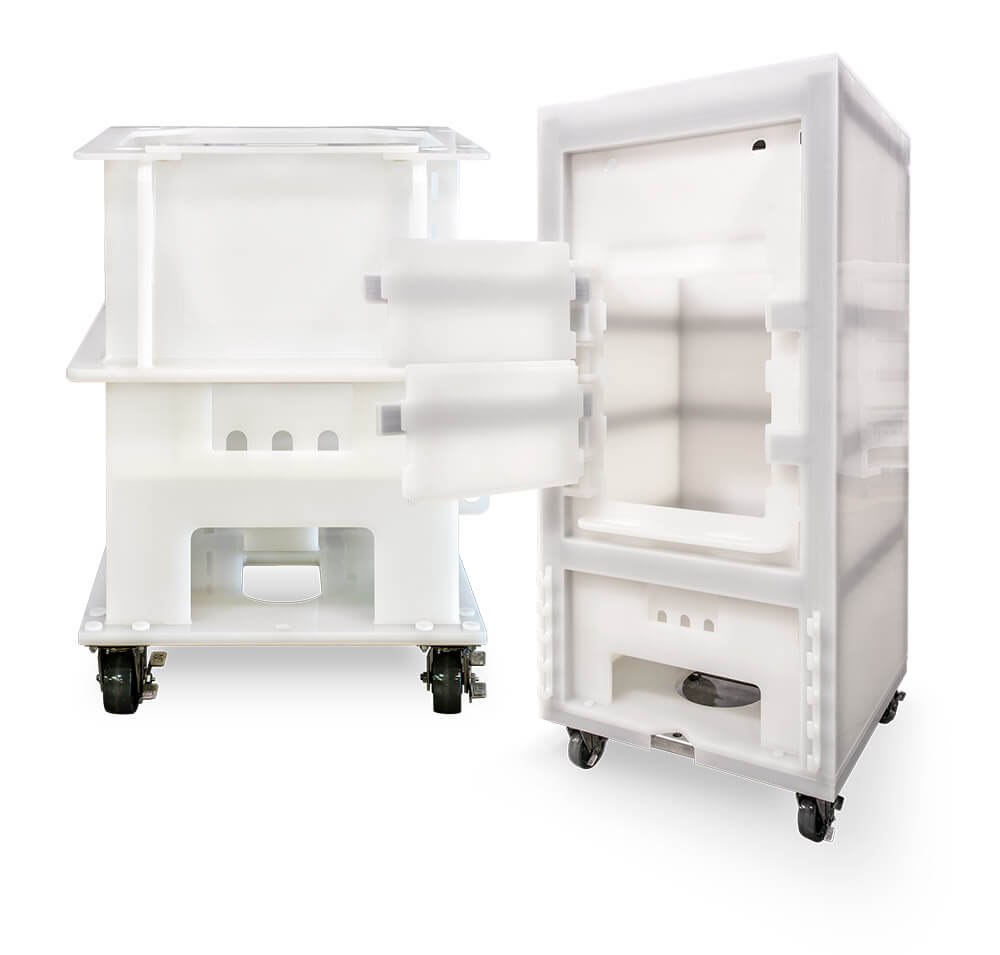As the pharmaceutical industry works to find the correct balance between stainless steel processing systems and single-use technology (SUT), drug manufacturers are realizing that SUT options can offer cost savings in labor, turnaround time, energy, and inputs like the water and chemicals needed for cleaning and sanitizing. Media or buffer totes are an integral part of this evolution, and as their use increases, manufacturers can find themselves scrambling to find a supplier that can meet their needs — particularly for larger projects. Supplier selection involves several considerations:
Materials of construction: Clients may prefer stainless totes or plastic totes for a number of reasons. Plastic totes can be fabricated in a number of different materials depending on process considerations such as light-blocking or product temperature (consider the freezing or thawing of products in totes where thermal expansion can be an issue). Selecting a supplier that has experience with a range of materials gives clients an opportunity to discuss the pros and cons of each material in order to make the right selection.
Availability and Lead Times: Time is extremely valuable as drug manufacturers strive to bring their product to market, and they want to know they can get equipment and materials quickly and when they need them. Extremely short lead times are often required, but it can be challenging to find a supplier who has the design and manufacturing capacity to provide a large number of totes in a short period of time.
High Quality: Whether plastic totes or stainless totes are selected, they must be high quality and robust enough to withstand substantial fluid weights, and this is especially important as SUT capacity gets bigger and bigger — even to as much as 3,000 liters and beyond. The supplier of choice must be capable of designing and fabricating totes that will not fail when used in real-world situations. If plastic totes are selected, they often must include stainless steel internal reinforcing frames to contain the added stress created by these larger volumes. Thus, it is important to select a partner like Acuity that has experience working with both plastic and stainless materials.
Optimal Ergonomics and Small Footprint: Manufacturers require totes that are easily movable and designed with safety of their workers in mind. In addition, because manufacturing plants are often limited in space, totes are often custom designed with an optimal footprint in mind so that they do not take up too much space in the plant. Accommodating these unique requirements means that the supplier must have an in-house design team that is innovative, flexible, and fast enough to meet project deadlines.
Acuity Process works with companies that design and fabricate both plastic and stainless totes, giving our clients options to help them make the best choice for their process.
Focus: PolyFab Plastic Totes
If the decision is made to utilize plastic totes, Acuity works very closely with our partner PolyFab Plastics in Springfield, Missouri to consistently meet manufacturers’ needs for strong, high-quality totes. The quality of the totes is due in part to Polyfab’s dedication to craftsmanship; they recognize how critical training is to guarantee high-quality plastic welds that simply will not fail. To guarantee that every component they make is structurally sound, as a part of their Quality Process Polyfab routinely sends their shop fabrication team for offsite training and recertification by the equipment manufacturer; welding equipment is also regularly inspected, upgraded, and recertified. Another Polyfab benefit: their team is trained and they maintain the equipment necessary to perform several different types of welds (e.g., full-bead, triangle-bead, or extrusion welds).
Working with Polyfab, Acuity has been able to design totes that are not only sturdy but also help minimize safety concerns. For example, custom hitches for master movers are routinely added; these allow each tote to be moved across the plant floor safely and easily. In another case, Acuity and Polyfab redesigned the door of a tote, making it in two pieces instead of one; with the divided weight, the door no longer posed a safety risk for workers.
Acuity and Polyfab are able to offer quick and timely fabrication because Polyfab has the shop capacity needed to absorb big projects, as the company owns a much bigger manufacturing space than other players in the industry. This short lead time is possible even when customization is required. For example, Acuity and Polyfab were commissioned to design and produce 14 customized 1,200 liter totes that had wireless pressure transducers for liquid level measurement. Despite the technical difficulty,, the team as well as a local Emerson supplier were able to design from scratch, produce, and deliver all of the totes in only 11 weeks – an unheard of timeframe in the industry.
Acuity’s partnership with Polyfab Plastics makes sourcing totes easy for pharmaceutical manufacturers.
Acuity is evolving right along with the industry, keeping pace with the changes in the equipment needed for more efficient processes. As part of this process, the company has developed partnerships with reliable and high-skilled suppliers. Working with Polyfab, Acuity has the capacity to keep delivering high-quality, customized totes when manufacturers need them, offering a simple solution for busy customers.



Leave a Reply
You must be logged in to post a comment.